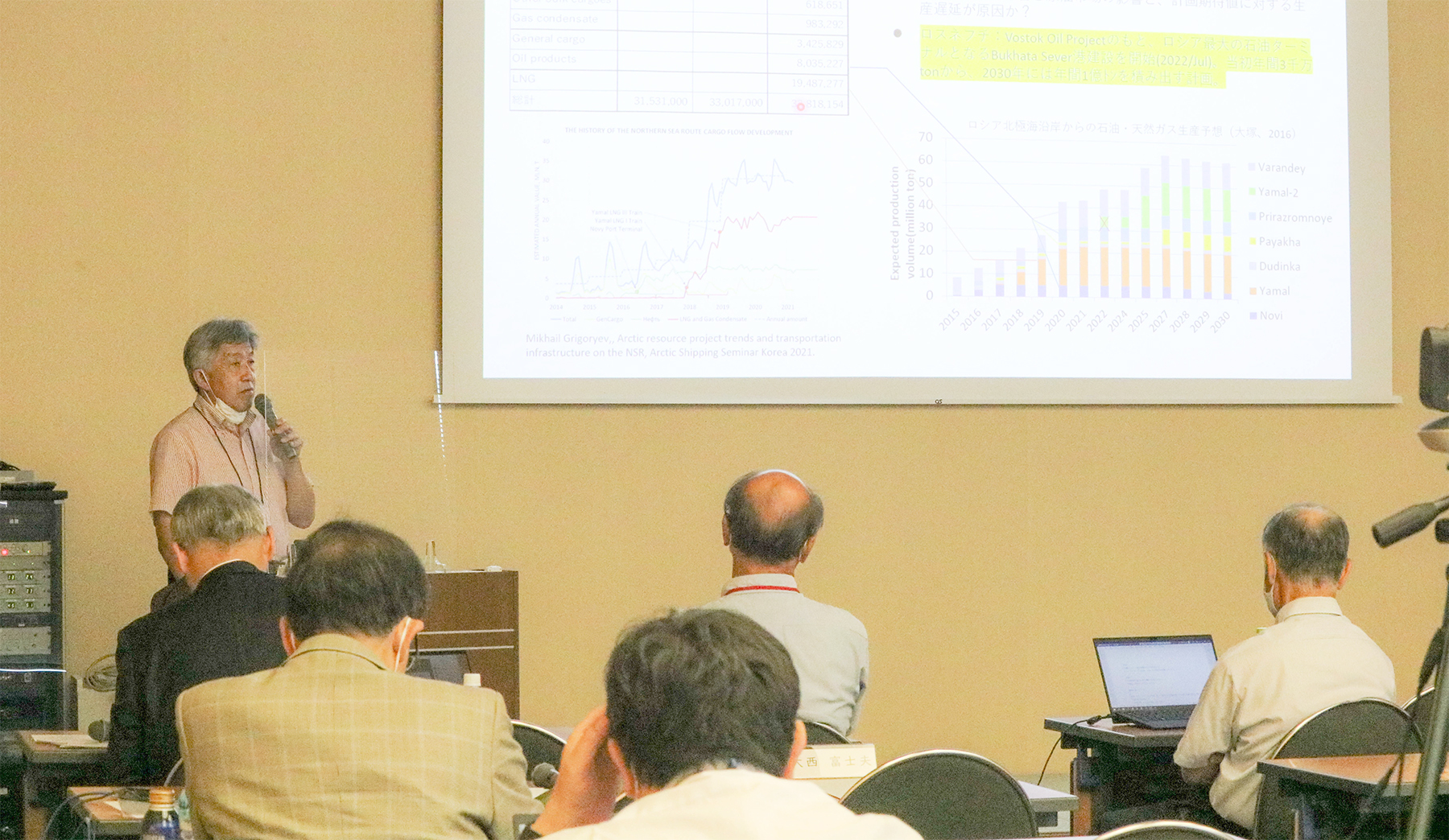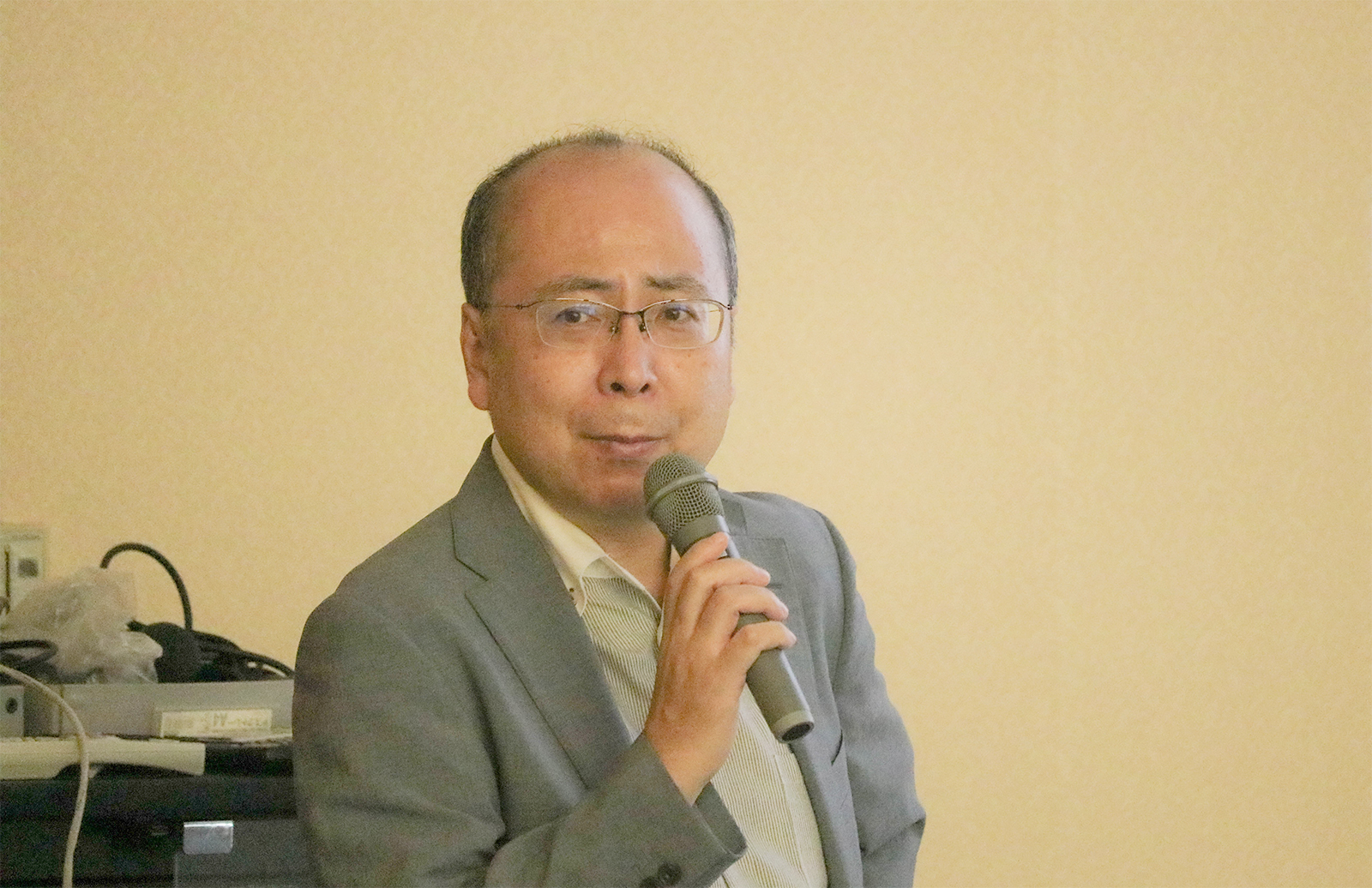Special seminar held on the Russia-Ukraine situation and the Arctic
University News | August 29, 2022

Professor Natsuhiko Otsuka of the Arctic Research Center explaining Russia’s use of the Arctic Ocean shipping routes.
On August 22, 2022, the Arctic Research Center (ARC) and the Slavic-Eurasian Research Center (SRC) at Hokkaido University jointly organized a special seminar entitled “The Impact of the Ukrainian Invasion — Economy, Industry, Politics, and Science in the Arctic.” The seminar was held in a hybrid format on the Sapporo campus and online, and was attended by 120 participants from industry, government agencies, universities, and think tanks.
The seminar analyzed the impact of the Russian-Ukrainian situation on the economy, politics, and scientific research in the Arctic region. Professor Shotaro Uto (ARC), one of the seminar organizers, said, “Six months after the Russian invasion of Ukraine, it is the right time to take a comprehensive view of the situation. I believe that we can provide a valuable analysis through collaboration between researchers at the ARC and SRC of Hokkaido University, and also by inviting experts in the field.”
The theme of the first part of the seminar was “Economy and Industry,” and it featured four speakers. Professor Shinichiro Tabata (ARC) provided a detailed analysis of the current state of Russian economy, including the sharp decline in Russian oil and gas exports, increased military spending, and high inflation rates. He also presented a grim long-term outlook, citing the expected decline in technology transfer and immigration from the West. Then, Michitaka Hattori, Director of the Institute for Russian and NIS Economic Studies, reported on the trade situation between Russia and other countries. Since Russia no longer publishes trade data, he analyzed the trade data provided by the counterpart countries. He then pointed out that “Japanese companies tend to underestimate the risk of continuing business with Russia.”

Michitaka Hattori, Director of the Institute for Russian and NIS Economic Studies, discussing the trade situation between Russia and other countries.
Subsequently, Daisuke Harada, Director of Russia Project Group, Japan Oil, Gas and Metals National Corporation (JOGMEC), explained the status of resource development by Russia in the Arctic region and the impact of its invasion of Ukraine. He noted that “the world still depends on Russia for natural gas, and a simple withdrawal from joint development could only benefit Russia.” Next, Professor Natsuhiko Otsuka of the ARC explained Russia’s use of the Arctic Ocean shipping routes. Otsuka claimed that, “Although the traffic in the Arctic Ocean shipping routes is temporarily decreasing partly due to the Russia-Ukraine war, long-term international use will continue to be considered in the future.”
In the second part of the seminar, three lectures were given on the theme of “International Politics and Science.” Associate Professor Fujio Ohnishi (ARC) analyzed the temporal pause of the Arctic Council and the possible impact of Sweden’s and Finland’s NATO membership, and argued that the Russia-Ukraine war was now causing a new mode in Arctic geopolitics where order and legitimacy would be politically contested more than ever. Then, Professor Hiroyuki Enomoto of the National Institute of Polar Research (NIPR) addressed the impact of the Russian invasion of Ukraine on scientific research. He noted the global importance of long-term monitoring in Russian Arctic and appealed for Russia’s continuation of the observations. Enomoto also said that “exchanges between Russia and other countries at the researcher level should continue.” Finally, Marina Lomaeva, International and Human Resources Exchange Coordinator at the ARC, reported on the effect of the invasion on Japan-Russia university collaboration and partnerships with companies. She noted that, despite numerous logistical and political challenges, universities retain hope of resuming student and faculty exchanges in future, and collaboration is continuing on an individual basis.
In the closing remarks, Professor Tabata said, “The Arctic region should have been the key to Russia’s economic development and international interests, but the Russian invasion of Ukraine has made this prospect uncertain. At Hokkaido University, researchers at the ARC and SRC will continue collaborating to advance our understanding of the situation and prospects.”
This seminar was supported by Hokkaido University Arctic Initiative for Future Earth and SDGs (HAI-FES) and the research programs on International Relations, Human Society, and Arctic Sea Routes in the ArCS II (Arctic Challenge for Sustainability II).
Written by Naoki Namba
Related link:
The Russia-Ukraine situation: Commentaries by experts at Hokkaido University

